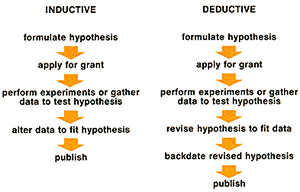|
SCIENCE
  Pharmaceutical corporations and medical research Pharmaceutical corporations and medical research
 Suppression of dissent in science Suppression of dissent in science
 How industry manipulates science How industry manipulates science
 The pharmaceutical drug racket The pharmaceutical drug racket
 Psychiatric drug facts with Dr. Bregging Psychiatric drug facts with Dr. Bregging
 Why you can't trust medical journals anymore Why you can't trust medical journals anymore
 Big pharma spends more on advertising than R&D Big pharma spends more on advertising than R&D
"Anything that can be done to a rat can be done to a human being. And we can do most anything to rats. This is a hard thing to think about, but it's the truth. It won't go away because we cover our eyes. This is cyberpunk." (Bruce Sterling)
EMERGING TECHNOLOGIES, BIOTECH & NANOTECH
 Why the future doesn't need us (by Bill Joy, co-founder of Sun & author of vi) Why the future doesn't need us (by Bill Joy, co-founder of Sun & author of vi)
 Radical Destabilizing Effects of New Technologies @ army.mil (archive) Radical Destabilizing Effects of New Technologies @ army.mil (archive)
 The Politics of Human Biotechnology The Politics of Human Biotechnology
 On Molecular Manufacturing (CRN), and Anissimov's paper (LBF) On Molecular Manufacturing (CRN), and Anissimov's paper (LBF)
 The politics of human biotechnology The politics of human biotechnology
 Technology: who chooses? Technology: who chooses?
 Act now to keep new technologies out of destructive hands Act now to keep new technologies out of destructive hands
Meet Locutus of Borg
"Some will hate it, some will love it, but biotechnology is inevitably leading to a world in which plants, animals and human beings are going to be partly man-made….Suppose parents could add 30 points to their children's IQ. Wouldn't you want to do it? And if you don't, your child will be the stupidest child in the neighborhood."
Lester Thurow, Professor of Economics and Management, Massachusetts Institute of Technology (MIT), Creating Wealth: The New Rules for Individuals, Companies and Nations in a Knowledge-Based Economy (New York: Harper Collins, 1999), page 33.
 "The first century or two of the new millennium will almost certainly be a golden age for eugenics. Through application of new genetic knowledge and reproductive technologies…the major change will be to mankind itself... (T)echniques…such as…genetic manipulations are not yet efficient enough to be unquestionably suitable in therapeutic and eugenic application for humans. But with the pace of research it is surely only a matter of time, and a short time at that." "The first century or two of the new millennium will almost certainly be a golden age for eugenics. Through application of new genetic knowledge and reproductive technologies…the major change will be to mankind itself... (T)echniques…such as…genetic manipulations are not yet efficient enough to be unquestionably suitable in therapeutic and eugenic application for humans. But with the pace of research it is surely only a matter of time, and a short time at that."
Glayde Whitney, Professor, Department of Psychology, Florida State University, "Reproduction Technology for a New Eugenics," paper for The Galton Institute conference Man and Society in the New Millennium, September 1999, published in The Mankind Quarterly (Vol. 40, No. 2, 1999), pages 179-192.
Whitney has come under fire for his racist writings, including his forward to My Awakening: A Path to Racial Understanding, by former Ku Klux Klan National Director David Duke.
"What is called for here is not genocide, the killing off of the population of incompetent cultures. But we do need to think realistically in terms of the 'phasing out' of such peoples . . . Evolutionary progress means the extinction of the less competent."
Richard Lynn, University of Ulster, Interview in Newsday (January 9, 1994)
"(I)f the cost of reprogenetic technology follows the downward path taken by other advanced technologies like computers and electronics, it could become affordable to the majority members of the middle class in Western societies….And the already wide gap between wealthy and poor nations could widen further and further with each generation until all common heritage is gone. A severed humanity could very well be the ultimate legacy of unfettered global capitalism."
Lee Silver, Professor, Department of Molecular Biology and Woodrow Wilson School for Public and International Affairs, Princeton University, "Reprogenetics: How do a Scientist's Own Ethical Deliberations Enter into the Process?" Humans and Genetic Engineering in the New Millennium: How are We Going to Get “Gen-Ethics” Just in Time? (Copenhagen: Danish Council of Ethics, 2000). Silver lectures widely on the social impacts of biotechnology.
"The right to a custom made child is merely the natural extension of our current discourse of reproductive rights. I see no virtue in the role of chance in conception, and great virtue is expanding choice….If women are allowed the 'reproductive right' or 'choice' to choose the father of their child, with his attendant characteristics, then they should be allowed the right to choose the characteristics from a catalog."
James Hughes, bioethics consultant, sociologist, bioethicist, health care policy analyst, producer of the public affairs program Changesurfer Radio, and Secretary of the World Transhumanist Association, in "Embracing Change with All Four Arms," Eubios Journal of Asian and International Bioethics (Vol. 6, No. 4, June 1996), pages 94-101.
"(In a few hundred years) the GenRich-who account for 10 percent of the American population-(will) all carry synthetic genes….All aspects of the economy, the media, the entertainment industry, and the knowledge industry (will be) controlled by members of the GenRich class….Naturals (will) work as low-paid service providers or as laborers….(Eventually) the GenRich class and the Natural class will become…entirely separate species with no ability to cross-breed, and with as much romantic interest in each other as a current human would have for a chimpanzee….(I)n a society that values individual freedom above all else, it is hard to find any legitimate basis for restricting the use of reprogenetics….(T)he use of reprogenetic technologies is inevitable….There is no doubt about it…whether we like it or not, the global marketplace will reign supreme."
Lee Silver, Remaking Eden: Cloning and Beyond in a Brave New World (New York: Avon Books, 1997), pages 4-7, 11
 "I believe that cloning will enable us to have some kind of eternal life. Cloning combining with age research will lead to an extending of human life. I don't believe in an eternal life anywhere except on earth. If we want to live in paradise, that is here. (..) I said that becoming eternal will be down the road. We are not there yet. Once we are able to upload personalities and memory from the brain to a computer and back to a brain, things which are under research today, that would make it possible to put us in a new body. That may be 20 or 30 years away, but that's what I'm talking about this research possibly leading to." "I believe that cloning will enable us to have some kind of eternal life. Cloning combining with age research will lead to an extending of human life. I don't believe in an eternal life anywhere except on earth. If we want to live in paradise, that is here. (..) I said that becoming eternal will be down the road. We are not there yet. Once we are able to upload personalities and memory from the brain to a computer and back to a brain, things which are under research today, that would make it possible to put us in a new body. That may be 20 or 30 years away, but that's what I'm talking about this research possibly leading to."
Dr. Brigitte Boisselier, the scientific director of Clonaid, testifies before a House subcommittee hearing on issues raised by human cloning research. Dr. Brigitte Boisselier, "In support of human cloning," MSNBC.com
"'Germline' therapy…will force us to re-examine even the very notion of what it means to be human (as) we become subject to the same process of conscious design that has so dramatically altered the world around us….Through this technology, we will seize control of our own evolution….By the time recipients of even the best engineered chromosome are ready to have children, it will be twenty or thirty years after they themselves were conceived. Their once state-of-the-art artificial chromosome will be hopelessly out-of-date, and they'll want to give their child the latest gene cassettes and artificial chromosomes. It's not so different from upgraded software; they'd want the new release."
Gregory Stock, Director of the Program on Medicine, Technology and Society, UCLA, in "The Prospects for Human Germline Engineering," Telepolis, (January 29, 1999).
"The advertising pitch for inheritable genetic modification is called "Organic Enhancement" because "the DNA molecules added to embryos are totally organic (and) all-natural….(K)eep in mind, you must act before you get pregnant. Don't be sorry after she's born. This really is a once-in-a-lifetime opportunity for your child-to-be."
Lee Silver, "Beyond 2000, " Time (November 8, 1999), pages 68-69. Silver adopts a whimsical tone to fantasize a marketing campaign for inheritable genetic modification by the "St. Genevieve" fertility clinic in the year 2025.
More human than human is our motto
"Like Frankenstein, we don't want to take responsibility for our technological innovations, we just want to celebrate our ingenuity in achieving them. Unthinkingly conceived and implemented technology is dangerous technology, the kind Frankenstein's monster railed about, the kind the demented Unabomber saw as justifying murder. But often it seems that unthinking technology is the kind that surrounds us." (Jon Katz)
 The programme to improve humanity through technology has antecedents in the eugenics experiments of the early twentieth century; in the techniques of lobotomization and shock therapy; in the behaviour modification described in B.F. Skinner's "Walden II"; in the soma of Aldous Huxley's "Brave New World", and its modern equivalent, Prozac. When we consider these specific technologies and their application, enthusiasm for the transhumanist attitude wanes, at least among a segment of the population, as additional questions arise. Who gets to decide what is "normal" or "improved"? Is human freedom or diversity compromised? Will there be unforeseen social consequences or technical side-effects? If the changes don't work out, will they be reversible - and will there be anyone capable of noticing or acting? The programme to improve humanity through technology has antecedents in the eugenics experiments of the early twentieth century; in the techniques of lobotomization and shock therapy; in the behaviour modification described in B.F. Skinner's "Walden II"; in the soma of Aldous Huxley's "Brave New World", and its modern equivalent, Prozac. When we consider these specific technologies and their application, enthusiasm for the transhumanist attitude wanes, at least among a segment of the population, as additional questions arise. Who gets to decide what is "normal" or "improved"? Is human freedom or diversity compromised? Will there be unforeseen social consequences or technical side-effects? If the changes don't work out, will they be reversible - and will there be anyone capable of noticing or acting?
|